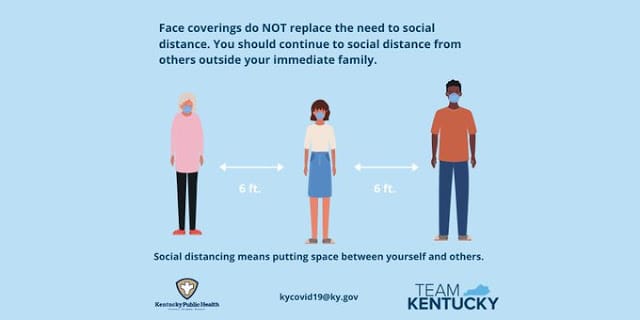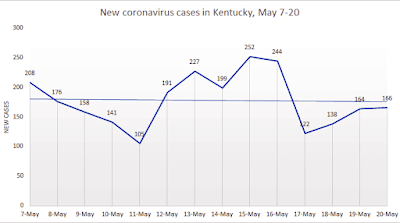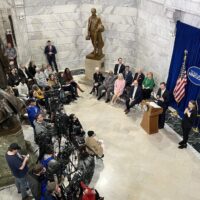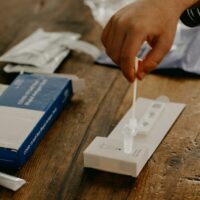As the holiday weekend approaches and he allows gatherings of up to 10 people, Gov. Andy Beshear is urging Kentuckians to focus on three areas to minimize their risk of coronavirus infection: their hands, their face and their space.

Beshear encouraged Kentuckians to keep their hands washed; to not touch people who are not in their immediate family; to wear a mask in close quarters; to avoid touching your face; to maintain 6 feet of separation from each other; and to entertain outside if at all possible.
He summarized it this way at his daily briefing: “Hands clean, and to yourself. Face covered if you’re close, and don’t touch it. And, finally, space. … We’re going to be really excited to see folks we haven’t in a while, but stay six feet apart; do it outside if you can; it’s going to make it very safe, comparatively.”
The governor also stressed the importance of wearing masks as the state reopens its economy, and encouraged Kentuckians to share social-media posts about why they wear masks and to talk to others about it.
“I wear a mask to protect my family, to make sure I am not bringing home this virus; because I want our economy to restart and thrive,” he said. “And I wear this mask because of my faith. In my faith, Jesus was asked about the two most important commandments, and he talked about loving God with all your heart, and he also talked about loving your neighbor as yourself.”
Then he shifted from religion to science to politics, more explicitly than he usually does.

(Kentucky Health News graphic)
He said “Every scientist out there says that this helps us protect our neighbor,” and “This is not a battle between political parties or ideologies. It is plain, basic public-health guidance … it is the same guidance on the federal and on the state level. And it is just smart, right? There is a national health pandemic, there is a virus out there that spreads based on droplets coming from the mouth, and it spreads from person to person. So this is covering your mouth so you don’t infect somebody else.”
Beshear also emphasized testing, saying it is absolutely critical to make sure Kentucky opens safely. It now has at least 155 testing locations, but the challenge is to get people to take advantage of them. Signups are available for new Kroger-sponsored drive-thru testing sites in Henderson, Bowling Green, Louisville and Lexington next week. “Let’s make sure we fill every spot. Let’s not have any no-shows,” Beshear said. “Let’s make sure that we get as much testing as possible. We have the capacity, now we’ve got to have the will.”
He noted that this week’s Kroger sites in Richmond and Louisville have gone well, but that Ohio County still has almost 300 spots available for tomorrow and Graves County has more than 350. Both counties have case numbers higher than the state average.
“This will be the last day that they are in either of those places,” he said. “This is your chance, folks, it doesn’t cost you anything. It lets you know if you have this virus, ensures that you are not infecting other people; this is one of our duties as citizens in Kentucky.”
Beshear announced 166 new cases of the coronavirus, bringing the state’s adjusted total to 8,167. Click here for the daily summary.
The new number shifted the state’s two-week trend of new cases from slightly upward to slightly downward. One of the federal guidelines for reopening state economies say it should be preceded by a two-week downward trajectory in new cases. Wednesday was the day all retail establishments in Kentucky could reopen.
Other COVID-19 news Wednesday:
- Beshear said there were no new cases of pediatric multi-symptom inflammatory syndrome, which is associated with COVID-19, and that the state had checked in on the 109 minors who have tested positive for the coronavirus and that all that talked with them were doing OK. To date, Kentucky has had four children diagnosed with the syndrome.
- The counties with the most new cases are Warren, 35; Jefferson, 31; Clark, 14; Fayette, 10; and Kenton, 10.
- Beshear announced 10 more deaths, raising that total to 376. He said six of them were in long-term care facilities.
- The deaths include a 73-year-old woman from Breckinridge County, a 90-year-old woman from Oldham County, a 70-year-old man from Boone County, a 79-year-old woman from Graves County, and four women and two men from Jefferson County. The women were 46, 70, 76, and 88; the men were 71 and 77.
- In long-term-care facilities, six more residents and six more employees have tested positive for the virus, for respective totals of 1,022 and 461. There have been a total of 207 deaths in these facilities. Click here for a daily report.
- Health Commissioner Dr. Steven Stack said it will take several months to test all 280 of the state’s long-term care facility residents and staff, calling it a “big lift.” The governor’s news releases says that so far more than 4,300 tests have been conducted, with plans to conduct another 2,100 over the next two days.
- In addition, he announced that the state would be providing personal protective equipment to the long-term-care facilities, since a federal shipment has been delayed until June.
- The governor said 474 COVID-19 patients are in the hospital and that 98 are in intensive care. That number is down significantly from Tuesday, when he reported 269 in intensive care. He said this huge drop was discovered after his administration double-checked these numbers with the hospitals, adding that they were working on ways to improve this data sharing. He said 2,919 Kentuckians have recovered from the virus.
- Beshear said that as Warren County hospitals fill up with COVID-19 patients, the overflow will be taken to UK HealthCare.
- It is still too early to say what kinds of fall sports will be allowed, the governor said, but the current trend looks to be games without fans. The state has not issued guidance for which youth sports will be allowed to resume on June 15, but he suggested it would likely be low-contact sports like baseball, tennis and swim teams.
- Beshear announced that $300 million from the Coronavirus Aid, Relief and Economic Security (CARES) will be awarded to city and county governments to cover COVID-19 related expenses. An application will be available Thursday at 8 a.m. on the Department for Local Government’s website. Click here for a list of eligible expenses and guidelines.
- Experts encourage people who wear eyeglasses to disinfect them often because the coronavirus can stick to glass for nine days, the Lexington Herald-Leader reports, offering tips on cleaning.
- Asked what his advice was about hydroxychloroquine, which President Donald Trump has said he is taking preventivly for the virus despite warnings from the Food and Drug Administration that it can cause heart problems, Beshear said, “I believe that people need to listen to their medical provider, that none of us out there know how to treat COVID-19, but our health care professionals do. This is a drug that to date has not been proven an effective treatment. In fact, it has been proven that it can be harmful. So to Kentuckians, don’t push your health care provider to prescribe to you something that they tell you can harm you. They want you to get better. … They are going to give you the best advice that they can. I would follow it, ask all the questions that you need to, but this is not been proven to be an effective treatment. In fact, it may be able to harm you.” He added that the president’s treatment was made in conjunction with his own doctors.
- A study by researchers from the University of Kentucky, Georgia State University and the University of Louisville looked at the effect certain social distancing practices had on the number of coronavirus cases between March 1 and April 27. It found that bar and restaurant closures and shelter-in-place orders slowed cases in a “statistically significant” way, while bans on large gatherings and closing schools did not have the same impact. Aaron Yelowitz, an economics professor at UK and co-author of the research, told the Post that he didn’t infer from the data that schools should have stayed open, thinking that parents just traded one type of social setting for another. Likewise, he thinks people also traded social interactions that they would have had at mass gatherings for other social interactions. The study shows that cases would have been 10 times higher without stay-in-place orders and 35 times higher without any restrictions; those findings were previously reported.
- UK Now reports on what you need to know about pediatric multi-system inflammatory syndrome, which is associated with COVID-19. As of May 18, four Kentucky children had been diagnosed with it.





